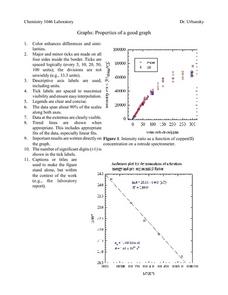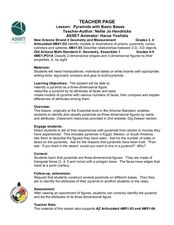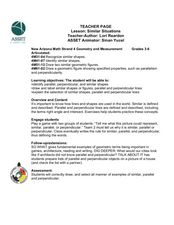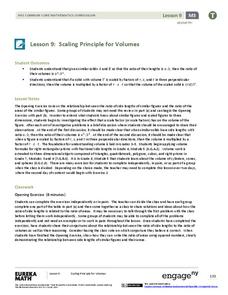MENSA Education & Research Foundation
Magical Musical Tour: Using Lyrics to Teach Literary Elements
Language arts learners don't need a lecture about poetry; they listen to poetry every day on the radio! Apply skills from literary analysis to famous songs and beautiful lyrics with a lesson about literary devices. As class...
Virginia Department of Education
Exploring 3-D Geometry
Take young mathematicians on an exploration of the world of 3-D geometry with this seven-lesson unit. After first defining the terms perimeter, area, and volume and how they apply to the real world, students continue on to learn the...
University of Georgia
What's So Special about Bottled Drinking Water?
Is artesian water designed to be better, or is it just from wells similar to those in the city of Artesium? This experiment looks at many different types of bottled waters, including artesian. Using a soap mixture, scholars test to see...
Illustrative Mathematics
What is a Trapezoid? (Part 2)
This collaborative activity investigates the meaning of a trapezoid and a parallelogram. It begins by presenting two different definitions of a trapezoid. Learners are to reason abstractly the difference between the two definitions and...
Curated OER
Tin-Foil Twinkles
Students compare and discuss characteristics and properties of 2- and 3-dimensional shapes. They construct 3-dimensional paper star figures, imaginatively customizing them with art tools and craft materials. Students analyze their...
EngageNY
Definition of Rotation and Basic Properties
Examine the process of rotating images to visualize effects of changes to them. The fifth instructional activity of 18 prompts pupils to rotate different images to various degrees of rotation. It pays special attention to rotations in...
Curated OER
Properties of a Good Graph
In this chemistry worksheet, students examine the common characteristics of an acceptable graph that is meant to be used to display data.
Ohio Department of Education
Describing and Creating Plane Figures - Grade One
Young mathematicians draw, create, and describe different shapes using triangles. They discuss attributes of the original and created shapes. Pupils classify the created shapes and draw and write in mathematics journals to communicate...
It's About Time
Refraction of Light
Don't shine like a diamond, refract light like a diamond. Young scientists use an acrylic block and a laser light to observe refraction. Advanced scholars figure the sine of the angles of reflection and incidence as well as mastering...
Curated OER
Plane Shapes and Solid Figures
In this math worksheet, students study the properties of plane shapes and solid figures. Students fill out a chart after they have calculated the number of flat surfaces, edges and vertices.
Curated OER
Observing Rocks
Fifth graders explore the various properties of earth and rocks. They play "Twenty Questions" with the teacher, and analyze a rock using a magnifying glass. They record their rock observations and list the differences between the wet...
Curated OER
Similarity and Congruence
High schoolers explore the concept of similarity and congruence. In this similarity and congruence lesson, students identify and verify whether or not two figures are similar, congruent, or neither. High schoolers use postulates and...
Curated OER
Three-Dimensional Play Dough
Fourth graders make models of three-dimensional figures and then use these play dough figures to observe and count the vertices, edges, and faces of the figure.
Curated OER
The Difference of Two Squares
Students practice the use of number properties through exploring the difference of two squares, creating an array model for multiplication, and work with decimal numbers. In groups, students explore patterns in an array and determine...
Curated OER
Pyramids with Basic Bases
Students explore pyramids. In this math lesson, students discuss where they have seen examples of pyramids. Students classify pyramids as three-dimensional figures and identify their attributes.
Curated OER
Describing the Physical World
In this physical world worksheet, students review concepts relating to the chemical and physical properties of matter, density of matter, and if matter is a solid, liquid, or gas. This worksheet has 9 terms in a word puzzle, 4 true or...
Curated OER
Similar Situations
Students explore intersecting lines. In this intersecting lines lesson, students investigate shapes consisting of parallel, perpendicular, and similar lines. Students investigate these lines in shapes around them.
Curated OER
Exploring Similarity Using Scale Drawings
Learners explore scale factor as they create a scale drawing of a box, then determine the surface area and volume of the original and the scale drawing. The one page worksheet contains activities and procedures with four questions.
Curated OER
Exploring the Properties of Rectangular Prisms.
Students define properties of rectangular prisms. In this geometry lesson, students identify the relationship between two and three dimensional objects. They use Cabri technology to graph their figures.
Curated OER
Exploring Properties of Rectangular Prisms
Pupils explore the properties of rectangular prisms. In this geometry lesson, students identify properties of two and three dimensional shapes. They use Cabri technology to create polygons and solve problems.
Curated OER
Tangent Properties
High schoolers explore properties of tangent lines. In this properties of tangent lines lesson, students discuss the perpendicular relationship between a tangent line on a circle and the circle's radius. High schoolers use that...
Curated OER
Soda Cans
Students identify and use properties of similar figures. In this geometry lesson, students use proportions of the sides of triangles to solve triangular relationships. They use soda can as their visuals.
EngageNY
Scaling Principle for Volumes
Review the principles of scaling areas and draws a comparison to scaling volumes with a third dimensional measurement. The exercises continue with what happens to the volume if the dimensions are not multiplied by the same constant.
Curated OER
The Case of Similar Substances
Students perform tests in the lab to identify an unknown substance. In this physical science lesson plan, students observe the physical and chemical properties of substances. They formulate a conclusion based on experimental results.

























